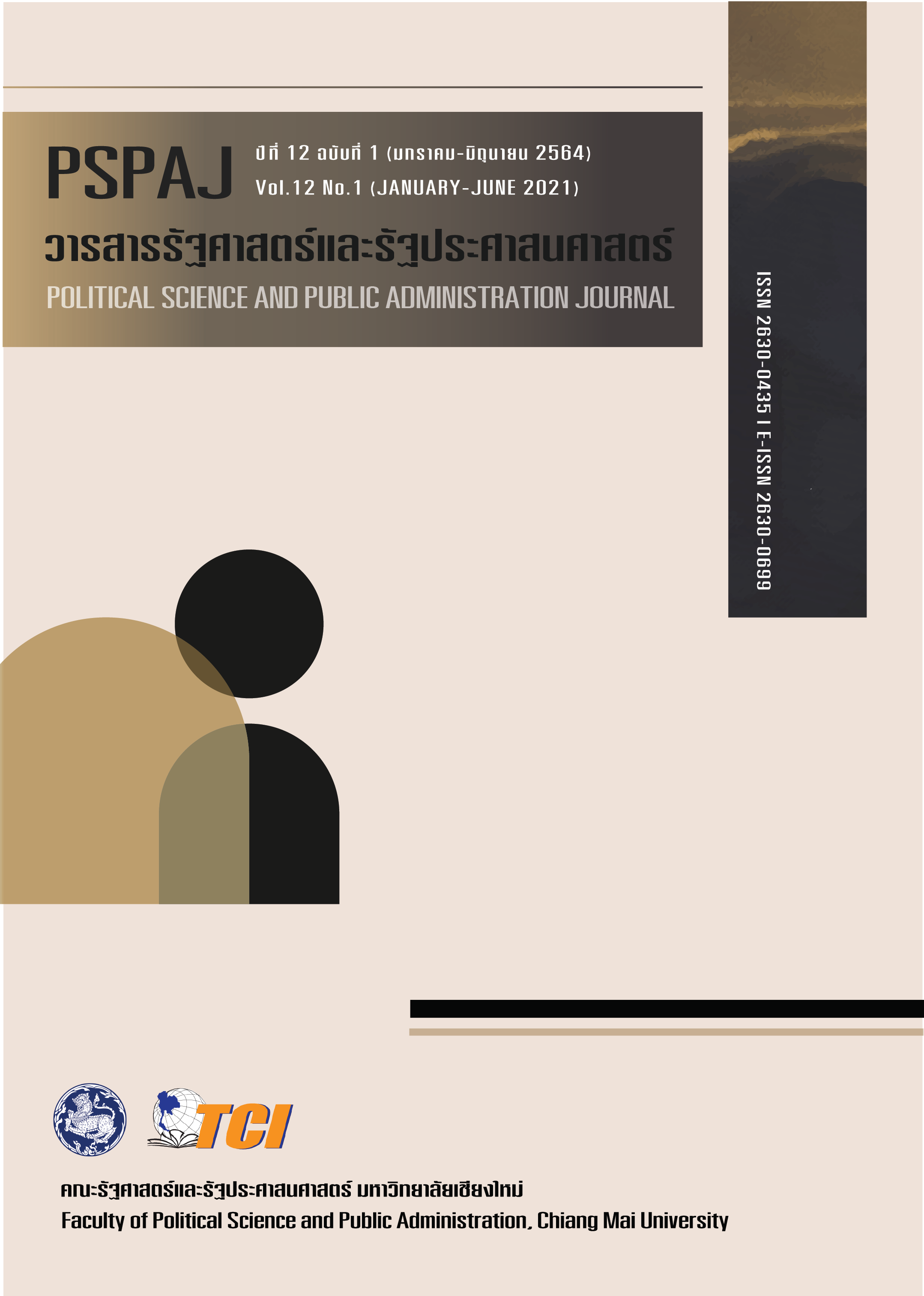The Formulation of Political Power by the Political Group in Tambon NongTao, KaoLiao District, Nakhon Sawan Province
Main Article Content
Abstract
The article aims to study and analyze trends of the formulation of political power by the political group in Tambon NongTao, KaoLiao District, Nakhon Sawan Province through the concept of the formulation of political power, patron-client system, and hegemony. The research has found that the social and cultural factors are first two steps to gain the political factors. The patronage system facilitates the use of bio-power to enter position of “Assistant Village Headman,” then the assistant village headman will take himself to the position of candidate for election of “Village Headman” in order to justify his power according to the principle of authority. After winning the election, the village headman needs experience and knowledge from the sub-district administrative committee for proactive and reactive local administration. The political group in Tambon NongTao has divided the political workers into three teams including: 1) practitioners, 2) strategists, and 3) academic and technology workers under the lead of “Sub-district Headman.” The practical approach called “tracking water activities,” which is the economic factor has repeated from 1998 until present day, this political group has successfully created the hegemonic status in the area. These three factors allow political group can establish the strong political power base and promote the member to be the candidate for the Chief of NongTao Sub-district Administrative Organization in 2020.
Downloads
Article Details
- เนื้อหาและข้อมูลที่ลงตีพิมพ์ในวารสารรัฐศาสตร์และรัฐประศาสนศาสตร์ถือเป็นข้อคิดเห็นและความรับผิดชอบของผู้เขียนบทความโดยตรง ซึ่งกองบรรณาธิการวารสารรัฐศาสตร์และรัฐประศาสนศาสตร์ ไม่จำเป็นต้องเห็นด้วย หรือร่วมรับผิดชอบใดๆ
- บทความและข้อมูล ที่ได้รับการตีพิมพ์ในวารสารรัฐศาสตร์และรัฐประศาสนศาสตร์ ถือเป็นลิขสิทธิ์ของวารสาร หากบุคคลหรือหน่วยงานใดต้องการนำข้อมูลไปใช้ประโยชน์ในทางวิชาการ ขอให้อ้างอิงแหล่งที่มาด้วย
References
กาญจนา แก้วเทพ, และสมสุข หินวิมาน. (2551). สายธารแห่งนักคิดทฤษฎีเศรษฐศาสตร์การเมืองกับสื่อสารศึกษา. กรุงเทพฯ: ภาพพิมพ์.
กิ่งกาญจน์ เอี่ยมลออ. (2555). การแข่งขันในการครองอำนาจนำทางความคิดระหว่างพรรคเพื่อไทยและพรรคประชาธิปัตย์ในการหาเสียงเลือกตั้งวันที่ 3 กรกฎาคม พ.ศ. 2554. (รัฐศาสตรมหาบัณฑิต), มหาวิทยาลัยเชียงใหม่.
เกษียร เตชะพีระ. (2543). แบบวิถีอำนาจไทย: ข้อคิดว่าด้วยความสัมพันธ์ทางอำนาจที่เกี่ยวข้องกับสาธารณสุขในสังคมไทย. กรุงเทพฯ: วิภาษา.
ณรงค์ บุญสวยขวัญ. (2549). นักการเมืองถิ่นนครศรีธรรมราช. กรุงเทพฯ: สถาบันพระปกเกล้า.
ธเนศ วงศ์ยานนาวา. (2554). ความสมเหตุสมผลของความชอบธรรม (การครอบงำ). กรุงเทพฯ: ภาพพิมพ์.
นิธิ เอียวศรีวงศ์. (2547). อ่านวัฒนธรรมการเมืองไทย. กรุงเทพฯ: ศิลปวัฒนธรรม.
พัฒนชัย สีนอเฟีย. (2552). ฐานอำนาจทางการเมืองในจังหวัดอ่างทองของนายสมศักดิ์ ปริศนานันทกุล. (รัฐศาสตรมหาบัณฑิต), มหาวิทยาลัยสุโขทัยธรรมาธิราช.
มติชนออนไลน์. (2562). กกต. ร่อนหนังสือถึงทุกจังหวัด สั่งเตรียมอุปกรณ์เลือกตั้งท้องถิ่นอีก 3 เดือน. สืบค้นเมื่อ 16 มิถุนายน 2562, จาก https://www.matichon.co.th/politics/news_1520411
มักซ์ เวเบอร์. (2560). การยึดมั่นในอาชีพการเมือง. กรุงเทพฯ: สมมติ.
มิเชล ฟูโกต์. (2558). ร่างกายใต้บงการ ปฐมบทแห่งอำนาจในวิถีสมัยใหม่. กรุงเทพฯ: คบไฟ.
ฤกษ์ชัย พูลสวัสดิ์. (2552). การสร้างฐานอำนาจทางการเมืองของกลุ่มธุรกิจในการเมืองระดับท้องถิ่นของไทย: ศึกษาเฉพาะกรณีกลุ่มการเมืองท้องถิ่นในเทศบาลตำบลกะรน จังหวัดภูเก็ต. (รัฐศาสตรมหาบัณฑิต), มหาวิทยาลัยสุโขทัยธรรมาธิราช.
วัชรพล พุทธรักษา. (2557). บทสำรวจความคิดทางการเมืองของ อันโตนิโอ กรัมชี. กรุงเทพฯ: สมมติ.
วิรัตน์ คำศรีจันทร์. (2556). Snowball Sampling Technique: การเรียนรู้และเข้าถึงชุมชนด้วยการอ้างอิงต่อเนื่องปากต่อปากในวิจัยแบบ PAR. สืบค้นเมื่อ 23 ธันวาคม 2561, จาก https://www.gotoknow.org/posts/428764.
สุรพล พรมกุล. (2554). ระเบียบวิธีวิจัยทางรัฐศาสตร์. กรุงเทพฯ: โอ.เอส.พริ้นติ้ง เฮาส์.
เจอโรเม่ คาราเบล. (2557). ความขัดแย้งของการปฏิวัติ อัลโตนิโย กรัมชี กับปัญหาของปัญญาชน. กรุงเทพฯ: บริษัทสำนักพิมพ์สยามปริทัศน์ จำกัด.
อคิน รพีพัฒน์. (2543). ระบบอุปถัมภ์และโครงสร้างชนชั้นสมัยรัตนโกสินทร์ตอนต้น. ใน อมรา พงศาพิชญ์, และปรีชา คุวินทร์พันธุ์ (บ.ก.). ระบบอุปถัมภ์ (น. 137-171). กรุงเทพฯ: วิญญู.
______. (2547). ระบบอุปถัมภ์กับการเมืองไทย สมัยคิดใหม่ ทำใหม่. ใน เจิมศักดิ์ ปิ่นทอง (บ.ก.). รู้ทันทักษิณ (น. 31-39). กรุงเทพฯ: สำนักพิมพ์ฃอคิดด้วยคน.
อมรา พงศาพิชญ์, และปรีชา คุวินทร์พันธุ์. (2543). ระบบอุปถัมภ์. กรุงเทพฯ: วิญญู.
ธีรยุทธ บุญมี. (2533). ระบบอุปถัมภ์ในสังคมไทย. ใน คณะกรรมการกลุ่มผลิตชุดวิชาสังคมและวัฒนธรรมไทย. เอกสารประกอบการสอนชุดวิชาสังคมและวัฒนธรรมไทย หน่วยที่ 1-7 (น. 198-205). นนทบุรี: โรงพิมพ์มหาวิทยาลัยสุโขทัยธรรมาธิราช.
Foucault, M. (1978). The History of Sexuality Volume 1: An Introduction. New York: Pantheon Books.
______. (1980). Power/Knowledge. New York: Patheon Books.


